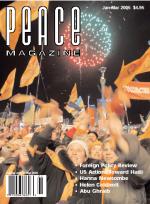
Peace Magazine Jan-Mar 2005, page 5. Some rights reserved.
Search for other articles by Edwin Abbott here
Search for other articles by Vivien Abbott here
Search for other articles by Felice Cohen-Joppa here
I read with great appreciation the October- December issue of Peace Magazine. In Murray Thompson's letter we are jolted out of our complacency in the realization of the immanent danger posed by the continuing "hair trigger alert" status of the so called nuclear deterrent.
The interview with Susan Brown gives due emphasis to the important relationship between achievement of sustainable peace and development programs in parts of our earth with dire needs. But I would take issue with her statement that "peace building has really only been on the map since 1997 as a development activity."
In the aftermath of World War II the American Friends Service Committee arrived at the concept that one of the root causes of conflict is the disparity in life opportunities and well-being that exist between the opulent westem world and the desperate conditions in many underdeveloped countries. They looked for an opportunity to experiment in changing such conditions.Nabakrishna Chaudhry, Chief Minister of Orissa, invited them to locate in that relatively backward Indian state. So, after considerable planning and organizing, Barpali Village Service came into being.
Barpali, on a gravelled road connecting several commercial centers, was a collection of thatched dwellings housing some 7000 villagers which were crowded along several lanes, muddy in the rainy season and dusty the rest of the year. It had a Primary Health Center, staffed by an overworked, underequipped doctor and compounder. It had no electricity, not even a telephone. It also held the Police Station that had responsibility for oversight of Barpali and 77 surrounding smaller villages which became the project's field of work.
An international staff was engaged: an English administrator, American agricultural extension worker, Oryea educationalist trained in Gandhian basic education, Oryea anthropology specialist, an American mechanical engineer and his secretary wife, a Danish woman, a Bengali nurse, and a Canadian doctor and his wife, also a medical doctor specializing in pediatrics.
The arrival of foreign workers in this isolated, caste-bound village attracted apprehension and suspicion. Were the Americans coming to take over the country so recently freed from British domination? When the chief minister came to welcome us before a village gathering, the Communist leader of the area almost stirred up a riot.
Attitudes changed gradually. When after two years the agriculturalist was leaving, we were invited to a meal in the home of the head of the village council. He set food before us but would not eat with us. After another year when we were leaving he invited us again but this time he ate with us. By this time the Communist leader had become our strongest supporter. The Barpali project was designed to run for ten years in the hope that something worthwhile would take root and would continue and spread.
We have revisited Barpali several times after the close of the project. It now has a station on a rail line which now passes by. It has becomes a thriving centre, has electricity, telephone kiosks, a new college and women's home science centre, a College of Pharmacy, and a private girls' school.
On our last visit, a village meal was arranged at which all castes ate together. We feel it an honor that over fifty years later, older villagers address us as Ed Bhai and Vivien Behen (Brother Ed and Sister Vivien).
Edwin and Vivien Abbott, Oro Station, ON
Mordechai Vanunu, the Israeli nuclear whistleblower, was released from prison in April, 2004, after serving 18 yours for revealing Israel's nuclear weapons program to the world with photos taken inside the factory. He told everything he knew about that program before he was kidnapped and arrested, yet even upon his release he was forbidden to leave the country or to speak to foreigners. On Nov. 11, 30 armed police stormed St. George's Anglican Cathedral in E. Jerusalem, seized his computers and cell phone, and confined him to house arrest.
How many times do they want to punish him for the same crime? He insists,"I have stood firmly behind this act of truth-telling for 18 years, and I continue to do so."
He wants to leave Israel and rebuild his life, and he has won vast admiration around the world for his courage. He was, for example, awarded the 2004 biennial LennonOno Grant for Peace by Yoko Ono; he and journalist Seymour Hersh each received $50,000.
You can help by making sure Israel knows the whole world is watching. You can nominate Vanunu for honors, awards, and honorary doctorates. Or e-mail your support to him: vanunumvic @hotmail.com.
Felice Cohen-Joppa
Tucson, AZ

Peace Magazine Jan-Mar 2005, page 5. Some rights reserved.
Search for other articles by Edwin Abbott here
Search for other articles by Vivien Abbott here
Search for other articles by Felice Cohen-Joppa here